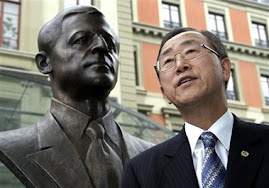UNESCO - the United Nations Educational, Scientific and Cultural Organization (UNESCO) was founded on 16 November 1945. For this specialized United Nations agency, it is not enough to build classrooms in devastated countries or to publish scientific breakthroughs. Education, Social and Natural Science, Culture and Communication are the means to a far more ambitious goal : to build peace in the minds of men.(...).
United Nations System website
Directory of UN Information Centres
Official Web Locator for UN-System of Organizations
Official documents of the UN
UN Bibliographic Information System (UNBISnet)
UN System Depository Libraries (DEPOLIB)
Research Gateway: UN Resources
UN Library NetworkUN Offices, Funds, Programmes, and Regional Commissions
UN System Pathfinder
World Map of UN Websites
Link,http://www.unesco.org, consultado a 19 de Outubro de 2006
United Nations System website
Directory of UN Information Centres
Official Web Locator for UN-System of Organizations
Official documents of the UN
UN Bibliographic Information System (UNBISnet)
UN System Depository Libraries (DEPOLIB)
Research Gateway: UN Resources
UN Library NetworkUN Offices, Funds, Programmes, and Regional Commissions
UN System Pathfinder
World Map of UN Websites
Link,http://www.unesco.org, consultado a 19 de Outubro de 2006





